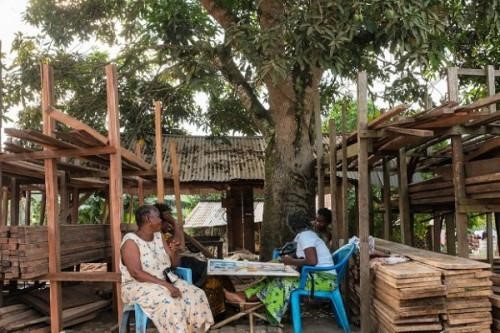73% Of Locally Sold Timber In Cameroon Are From Illegal Sources

Access to timber of legal origin is a major constraint to the development of small and medium size enterprises in Cameroon.
According to a study by the United Nations Food and Agriculture Organisation through its FAO-EU Flegt programme, 73 per cent of timber sold in the local markets in Cameroon is from illegal sources.
“The proportion of sawed wood from legal sources sold in the domestic market is estimated at only 27 per cent of the volume of the total timber in circulation in the markets of the principal towns of the country. The remaining 73 per cent of thus represents the part of illegal timber furnished in the domestic market and its operators,” FAO stated.
Through its FAO-EU Flegt programme, the UN Food and Agriculture Organisation affirms that it is trying to reverse the situation. Thus, since 2016, 142 operators of the secondary timber transformation sector have been trained on legality.
The action was followed in 2019 with 140 operators, among whom were 26 women who were sensitised by the Cameroon Federation of Associations and Professionals of the Second Wood Transformation Sector popularly known by its French acronym FECAPROBOIS.
With the assistance of FECAPROBOIS, 35 other operators and 142 artisan small and medium-size enterprises, operators within the second timber transformation sector and members of the forestry community of North Cameroon also benefited from training on the obligations of legality in collaboration with the Chamber of Commerce.
“This training has been very beneficial to some of us who did not know the difference between legally sourced timber and the illegal one. One would have expected that our primary source of information on the legality of the timber we sell should have been the forestry officials. On the contrary, they have only been harassing us and extorting money from us because they wanted us to remain in the dark so that they continue exploiting us,” said one of the female beneficiaries of the training.
Support Our Journalism
There are millions of ordinary people affected by conflict in Africa whose stories are missing in the mainstream media. HumAngle is determined to tell those challenging and under-reported stories, hoping that the people impacted by these conflicts will find the safety and security they deserve.
To ensure that we continue to provide public service coverage, we have a small favour to ask you. We want you to be part of our journalistic endeavour by contributing a token to us.
Your donation will further promote a robust, free, and independent media.
Donate HereStay Closer To The Stories That Matter




